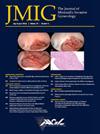Preoperative Hypoalbuminemia and Surgical Complications in Benign Minimally Invasive Hysterectomy
IF 3.3
2区 医学
Q1 OBSTETRICS & GYNECOLOGY
引用次数: 0
Abstract
Study Objective
To evaluate the association between preoperative hypoalbuminemia (<3.5 g/dL) and postoperative complications in patients undergoing minimally invasive hysterectomy for benign conditions.
Design
A prospective cohort study used data from the American College of Surgeons National Surgical Quality Improvement Program (NSQIP) database from 2012 to 2020.
Setting
Multi-institutional data collected through the NSQIP database across various U.S. hospitals.
Patients or Participants
A total of 69,325 patients met the inclusion criteria, with 65,920 (95.1%) in the normal preoperative albumin level group (≥3.5 g/dL) and 3,405 (4.9%) exhibiting preoperative hypoalbuminemia.
Interventions
No experimental intervention. Data analysis focused on comparing 30 days postoperative outcomes between albumin level groups.
Measurements and Primary Results
Information collected included demographics data, preoperative data, operative indication and postoperative complications. The primary outcome was the incidence of any postoperative complication, further classified as major or minor using the Clavien-Dindo classification. Patients with hypoalbuminemia had significantly higher complication rates overall (10.5% vs. 6.9%, p<0.001), including minor (8.0% vs. 4.7%, p<0.001) and major (3.4% vs. 2.8%, p=0.022) complications. Hypoalbuminemia was significantly associated with increased risks of reintubation, blood transfusion, surgical site infection, and pneumonia. Multivariable logistic regression confirmed hypoalbuminemia as an independent risk factor for any complications (aOR 1.39, 95% CI 1.23–1.56) and minor complications (aOR 1.52, 95% CI 1.32–1.72). When stratifying into five groups of albumin level, higher preoperative albumin levels were associated with a progressive reduction in complication risks.
Conclusion
Preoperative hypoalbuminemia is an independent predictor of postoperative complications in minimally invasive hysterectomy for benign conditions. Routine preoperative nutritional assessment and optimization, including correction of hypoalbuminemia, should be considered to reduce perioperative morbidity. Further research is needed to assess the effectiveness of such interventions in the perioperative setting and the long-term complications.
良性微创子宫切除术术前低白蛋白血症及手术并发症
研究目的探讨良性微创子宫切除术患者术前低白蛋白血症(3.5 g/dL)与术后并发症的关系。设计一项前瞻性队列研究使用了2012年至2020年美国外科医师学会国家手术质量改进计划(NSQIP)数据库的数据。设置通过NSQIP数据库在美国各医院收集的多机构数据。患者或参与者共69,325例患者符合纳入标准,其中65,920例(95.1%)为术前白蛋白水平正常组(≥3.5 g/dL), 3,405例(4.9%)为术前低白蛋白血症。干预:无实验性干预。数据分析的重点是比较白蛋白水平组术后30天的预后。测量和主要结果收集的信息包括人口统计学资料、术前资料、手术指征和术后并发症。主要结局是术后并发症的发生率,并根据Clavien-Dindo分类进一步分为严重或轻微。总体而言,低白蛋白血症患者的并发症发生率明显更高(10.5%比6.9%,p= 0.001),包括轻微并发症(8.0%比4.7%,p= 0.001)和严重并发症(3.4%比2.8%,p=0.022)。低白蛋白血症与再插管、输血、手术部位感染和肺炎的风险增加显著相关。多变量logistic回归证实低白蛋白血症是任何并发症(aOR 1.39, 95% CI 1.23-1.56)和轻微并发症(aOR 1.52, 95% CI 1.32-1.72)的独立危险因素。当将白蛋白水平分为五组时,较高的术前白蛋白水平与并发症风险的逐渐降低相关。结论术前低白蛋白血症是良性微创子宫切除术术后并发症的独立预测因素。应考虑常规术前营养评估和优化,包括纠正低白蛋白血症,以减少围手术期发病率。需要进一步的研究来评估这些干预措施在围手术期环境和长期并发症中的有效性。
本文章由计算机程序翻译,如有差异,请以英文原文为准。
求助全文
约1分钟内获得全文
求助全文
来源期刊
CiteScore
5.00
自引率
7.30%
发文量
272
审稿时长
37 days
期刊介绍:
The Journal of Minimally Invasive Gynecology, formerly titled The Journal of the American Association of Gynecologic Laparoscopists, is an international clinical forum for the exchange and dissemination of ideas, findings and techniques relevant to gynecologic endoscopy and other minimally invasive procedures. The Journal, which presents research, clinical opinions and case reports from the brightest minds in gynecologic surgery, is an authoritative source informing practicing physicians of the latest, cutting-edge developments occurring in this emerging field.

 求助内容:
求助内容: 应助结果提醒方式:
应助结果提醒方式:


